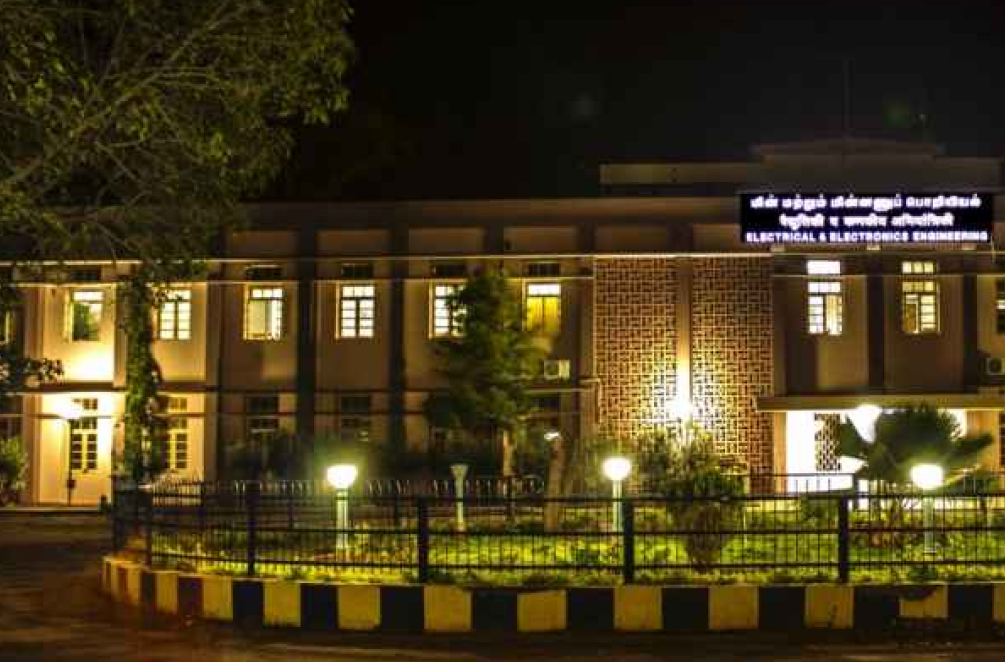The National Institute of Technology (formerly Regional Engineering College) Tiruchirappalli was established as a joint venture of the Government of India and the Government of Tamil Nadu in 1964 to produce world-class engineers who will cater to the growing technological needs of the nation.
The institute was granted Deemed University status with the approval of the UGC / AICTE and Government of India in 2003 and renamed as National Institute of Technology, Tiruchirappalli (NIT-T). NIT-T has been declared as institution of national importance by National Institute of Technology act 2007. The move was intended to provide teaching and research in the branches of engineering, science, technology and management for the advancement of teaching and research. NIT Tiruchirappalli is one among them and its basic structure, functions and powers are briefed in the NIT act 2007 and NIT statues 2009.
National Institute of Technology, Tiruchirappalli has carved a mark on the National scene last year by being ranked first among all the NITs and 12th among all the technical institutes in the country by the Institute Ranking framework (NIRF) of the Government of India. National Institute of Technology, Tiruchirappalli also won the prestigious CII-AICTE best industry linked institute by competing with other IITs, NITs and IIITs.
The institute also received national level awards from FICCI for social responsibility and from ASSOCHAM for the best institute to used ICT tools in education. The institute also received High impact Entrepreneurship Campus Award jointly awarded by the Ministry of Skills Development and Entrepreneurship. As matter of fact, among the top reputed technical institutes of the country, National Institute of Technology, Tiruchirappalli has reached the pinnacle in academic reforms and research. The academic conclave conducted in 2015, has set the Institute on a road to major academic transformation.
The senate of the institute has approved the deliberations of the Conclave and has endorsed the introduction of flexible curriculum, minor specializations, flipped class rooms based on course plans and new evaluation models. The flexible curriculum designed and implemented by National Institute of Technology, Tiruchirappalli has been recognized as a model curriculum by NIT council. The institute also undertook a major peer review process by bringing in experts from IITs, leading industries and other able educationalists. The critical comments of the reviewers were quite helpful in striving further to reach global standards.

National Institute of Technology, Tiruchirappalli now offers ten under graduate courses and twenty six postgraduate courses in various disciplines of Science, Engineering and Technology besides Ph.D. programme in all the departments. Admission to Undergraduate Programmes is based on +2 / other Qualifying Examination and in the Joint Entrance Examination, JEE (Main).
Admissions are open for Foreign Nationals / Persons of Indian Origin (PIOs) / Non-Resident Indians (NRIs) under Direct Admission of Students Abroad (DASA) Scheme. Admission to postgraduate Programmes are based on the scores in the Graduate Aptitude Test in Engineering (GATE) and the admissions are through the Centralized Counseling for M.Tech. / M.Arch./ M.Plan.. Admissions (CCMT). Admissions to M.Sc. Programmes (Physics, Chemistry and Computer Science) are based on the marks obtained in entrance test conducted by the Institute and the qualifying degree examination marks. Admission to MBA is based on the scores in the Common Admission Test (CAT) examinations.
Admission to MCA Programme is based on the scores in NIT MCA Common Entrance Test (NIMCET). Admission to Master of Science (By Research) is based on the scores in the Graduate Aptitude Test in Engineering (GATE). The research programmes (MS and Ph.D.) train the candidates to pursue original research ideas and augment the existing knowledge. It prepares them for academic as well as research and development careers.
Admission to Doctor of Philosophy is based on the following categories. (1) Ph.D. (Full time) / Stipendiary (2) Ph.D. (Full time) / Project (3) Ph.D. (Full time) / Non-Stipendiary (4) Ph.D. / (Part time – External / on campus). The short listed candidates based on the written test performance need to appear for a technical and personal interview by the Departmental Research Committee.
Dr. Ramakalyan Ayyagari, Department of Instrumentation & Control Engineering
Dr. V. Mariappan, Department of Mechanical Engineering
Roles and Responsibilities:- Admission, Enrollment
- Academic Schedule / Calendar, Assessments
- Publication and distribution of the syllabi
- Temporary Break of Study, Admission Cancellation
- Scholarships, No Objection Certificate
- Industrial Visits
- Curriculum Development, Board of Studies
- Feedback and follow-up
- Academic Audit, Data Management
- Co-ordination for the conduct of Convocation & Institute Day
- Data for Convocation / Institute Day
- Maintenance of Academic Records, Archiving of Academic Records
- Information for RTI / MHRD queries, NAD
- Study in India
- Any other duty assigned by the Institute
Dr. P. Srinivasa Rao Naik, Department of Computer Science and Engineering
Roles and Responsibilities:- MIS (Academic module)
- Course Registration, MIS, Course plans
- Co-coordinating the finalization of session’s evaluations and ensuring the timely declaration of results
- Performance Analysis Committee
- Results, Reassessment, Redo, Formative Assessment
- Updating of Regulations and incorporation in the MIS
- Any other duty assigned by the Institute
Dr. P. Srinivasa Rao Naik, Department of Electrical and Electronics Engineering
Roles and Responsibilities:- Admission, Enrollment
- Course Registration, MIS, HTTA
- Scholarships
- Academic Schedule / Calendar
- Assessments, Publication and distribution of the syllabi
- Performance Analysis Committee
- Results, Reassessment, Redo
- Temporary Break of Study, Admission Cancellation
- Industrial Projects
- Curriculum Development, Board of Studies
- Feedback and follow-up
- Academic Audit, Data Management
- Data for Convocation / Institute Day
- Co-ordination for the conduct of Institute day / Convocation
- Maintenance of Academic Records, Archiving of Academic Records
- Information for RTI / MHRD queries, NAD
Dr. P. Senthil, Department of Production Engineering
Roles and Responsibilities:- Admission, Enrollment
- Course Registration, MIS, HTRA
- Directed Study, Results
- Full time to Part-time conversion, Temporary Break of Study, Admission Cancellation
- Data Management, Publication (SCI, SCIE, SCOPUS, ESCI)
- Co-ordination for the conduct of Institute day / Convocation
- Data for Convocation
- Maintenance of Academic Records, Archiving of Academic Records
- Information for RTI / MHRD Queries, NAD
- Any other duty assigned by the Institute
Dr. T. Sivasankar, Department of Chemical Engineering
Roles and Responsibilities:- Accreditation
- Peer Review
- Senate matters
- NIRF, Academic Reforms
- NAD, Academic Audit
- Data for Convocation / Institute Day
- Co-ordination for the conduct of Institute day / Convocation
NAD - Any other duty assigned by the Institute






